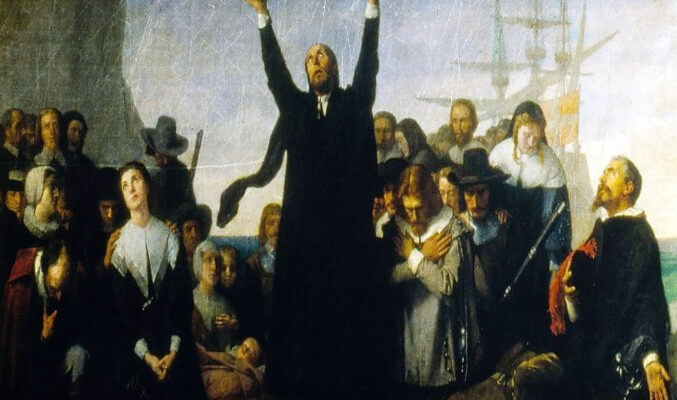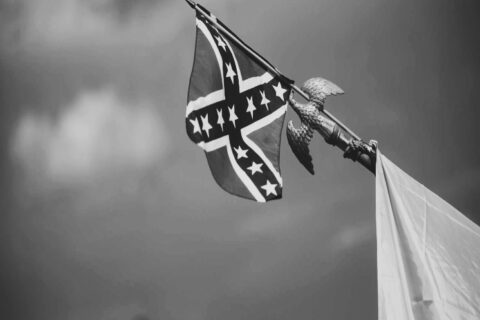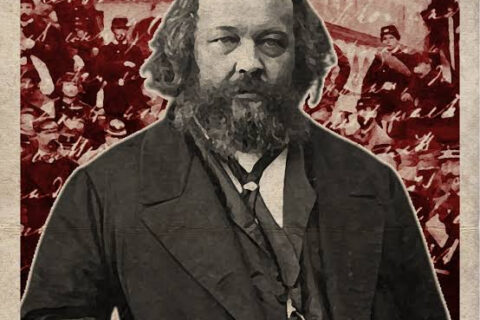History is not static. It flows smoothly, as a river from one point to the next.
Where we are today is a process from where we were yesterday. We are always in a state of becoming.
The United States of America is not a millennium-long nation as many in Europe. So, we can trace many of our streams and creeks back only a few centuries to learn a wealth of information.
(Obviously, the nations and blood lines before many of the original colonists came over are important, but what is also imperative is the mindset that they had upon arrival that still lingers to this day.)
They were quite a few original colonial groups. The main ones I’m focused on today are the Puritans and the Quakers.
The Pilgrims are mixed in there, too, but they have a very important distinction from the Puritans that we must address.
The Pilgrims were also called separatists. They wanted to separate from the Anglican church. The Puritans had a much different mindset. They wanted to purify that same church.
Separate versus purify.
While the two groups are similar in their Calvinist beliefs, and in their hesitation to support the Church of England, this subtle mindset difference is no small thing to scoff at.
Reform versus separation is a huge difference in belief. This really is the difference between an American conservative versus an American dissident. One believes in reforming the system; the other realizes that reform is impossible.
That covers a political system. Now imagine how much more impactful it is for a religious system, especially back in their day. This is no minor difference. The reformers were a danger back then, just as they are now.
The Puritan mindset that came to dominate many regions in New England radically impacts us to this day. The Pilgrims left their mark, but mostly only for the Revolutionary and Civil War eras. After which, their mindsets seemed to die out more so than the other early settlers.
Many Puritans came over in ships, such as the Arbella, that ended up carrying over a 1,000 Puritans to Massachusetts. They created Harvard College, which continues to indoctrinate people now more than it even did back then.
In the late 1630s, there was a great migration of Puritans out of England. Nearly 14,000 settlers came to Massachusetts.
John Winthrop once said, “we shall be as a city upon a hill, the eyes of all people are upon us.” They felt they were called for greatness and were always a beacon for others to look up to. More on this note later.
Not everything that the Puritans did was bad. They increased the literacy rate, had their children reading the Bible, and created a really solid foundation for where we are now.
But the Puritans had a peculiarity that is still with us today. That peculiarity is their underlying root beliefs, such as the enforcement of their beliefs on to others (for the “betterment of others”, of course), and their habit of showing off how good they are publicly.
Does that sound familiar? It should. That is exactly what the modern leftists to still do to this day. They act holier than thou, attempt to force their beliefs on everyone else, and constantly spread the gospel of leftist lies.
The Puritans, throughout the course of their history, abandoned their Bible. They switched to a social focus. This heritage is still with us today with modern leftist groups.
They kept the values and underlying philosophies, but tossed out the originator of those values/philosophies: God and the Bible. Which then creates a wicked perversion of what once was.
But the Puritans are not alone in the river of history. They are one Creek that merged with another Creek to create the River of Leftism.
That other Creek is the Quakers.
William Penn used his land award in the New World to create a “quaker paradise”. It was also to avoid similar persecution that they were facing in England, just like the Puritans/Pilgrims.
Penn used the land award and shipped in the Quakers. Thus, the Society of Friends was truly born in the New World.
The Quakers had their quirks. They were devout pacifists. The Quakers were also incredibly liberal, even by modern American standards today. They demanded religious freedom, got along with the Native Americans, women were given greater freedom than anywhere else in the New World, all men were considered equals, and similar beliefs promulgated their land.
Does all of that also sound familiar? Again, it should. It’s the roots of modern leftism.
In the earlier colonial days, there were three major cities in the Puritan/Quaker region. Boston, New York, and Philadelphia. Philadelphia was controlled by the Quakers and Boston by the Puritans. Their influence eventually grew to encompass much of New York state and surrounding territories.
From there, pre-Civil War, they spread west at a rapid pace to combat the ever-growing South. They’ve since spread far from their original home and have taken much of the West Coast and many major cities in between.
The combination of the Puritans and Quakers left its mark on modern America.
What I believe happened was that the mindset—the underlying philosophy—of the Quakers converged with the Puritans. This led to the modern leftist.
- What happens when you combine the Quaker belief in tolerance with the Puritan feeling of needing to force your beliefs on to everyone else?
- What happens when you combine the Quaker concept of brotherly love with the Puritan concept of superiority?
- What happens when you combine the Puritan desire to reform what they dislike with the Quakers’ Enlightenment values?
The answer to all the above is, of course, leftism.
It is not hard to see modern leftism reflected in these instances. The Puritans’ spiritual descendants simply switched out the religious zeal for a social-political one. The Quakers kept their tolerance, equality, and egalitarianism but merged it into the Puritan secular evangelism.
What does this mean? Well, it means that:
- Leftism is the bastard child of the spiritual degeneration of the Puritans and Quakers.
Mix those two groups together, subtract God, toss in subjective secular morality, switch a spiritual focus to a material focus, and what do you get? You get the pink-haired nutcases and sanpaku-eyed freaks we are all so familiar with today.
Just like how the old Puritans sought to “purify” the Church of England, our new leftist Puritans seek to “purify” the American continent. From many things, such as the new sin of Whiteness and the secular sin of racism. The Quakers are no different. They once called for tolerance and equality in their communities, they now demand it in every community.
It is no surprise then that their universities (Harvard) and their regions (the Northeast) remain leftist strongholds. It’s where this all began and where it morphed into modernity’s variant.
The Middle and New England Colonies combined into one monstrosity.
History really is a river. If you ever question one aspect of what stands in front of you, it can be immensely helpful to just look back upriver. The creeks flowing into the river can give you immense information to help you understand why the river is how it is now.
And if you ever wonder why leftism is as it is, look back to its origins in New England. You will find a wealth of information to help you piece together the spiritual ancestors of our modern leftists.

A Christian, husband, father, and American dissident. Join him in seeking truth and sipping sweet tea during the collapse of the American Empire. You can find more of his work at hiddendominion.com. Eph. 5:11.






Very instructive.
The few times I have needed to visit MA and the eastern seaboard, it feels like I am walking in oatmeal. The spiritual atmosphere is very heavy and oppressive. Can’t wait to leave and return to some place relatively clean.
I will add that the impetus and leaders for the 1848 Seneca Falls Conference were almost exclusively Quakers. This began political feminism in America . . . another foul get of Enlightenment equality and liberation values. The Quakers were a malevolent influence in the U.S.
I did not know that about the Seneca Falls Conference—How fascinating. Great find. That would seem to be another data point to corroborate the Puritan/Quaker hybridization theory.
Feminism is a prime example of the bastardization of both, as it includes the egalitarian lie (Quaker), tolerance (Quaker), weakening of men (Quaker-pacificism), feelings of supremacy (Puritan), and forcing one’s beliefs on others (Puritan)
No doubt the Quakers completely backwards theology and ideology really messed us up.
Very interesting article on a subject that has absorbed my attention for quite some time. I love the theology of many of the Puritans such as John Bunyan, and even Thomas Shepard who founded Harvard, but, (like Richard Weaver in his fine essay ‘Two Diarists’) have little time for Cotton Mather. I don’t necessarily agree with the Rev. Dr. Atkinson’s observations which follow, but offer it for yours and our readers’ consideration:
“Puritanism is English character intensified by English tyranny, and transplanted to New England. Presbyterianism is Scotch and Scotch-Irish character, which has been urging a war of resistance to English aggression from the days of Bannockburn down to the exodus of the Free Church of Scotland. Presbyterianism was an organized institution in Scotland a century before this existing form of Puritanism was born, and was as different from it in age, in origin, and in principle as John Knox was from Oliver Cromwell. The simple truth is that the English Puritan and the English Cavalier are both types of the same essential English character. We prefer to have neither for our masters. Both are specimens of the self-same English spirit, which can see nothing good in any direction that does not trace its origin to England. That same English spirit of boastful assumption, which, having made Plymouth Rock the blarney stone of the North, would rear a similar monument of self-laudation on the sands of Jamestown.” pp. 377-8.
‘Puritanism and Presbyterianism’, Southern Presbyterian Review, Rev. Dr. Atkinson, ‘The Land We Love’, Vol. 1
Great article and comment German Confederate.
I had read a book about Captain Kidd. Captain Kidd was financed by New England puritans in his privateering ventures. This legal piracy became unlawful because Captain Kidd operated outside of the queen of England and was hanged for it. The author of the book claimed Harvard was started in part or whole (I can’t remember) by money from NY/NE privateers.
I hope to give you the book reference one day, unable to do so now.
I am very familiar with how the English puritans came to the new world as shareholder financed stock companies. I must admit, I am not familiar with the Jamestown settlement, but I do know that the Pilgrims were companies and not colonies when they first arrived. The puritans were amongst the first people of England to invest in the Dutch East India stock company.
After much reading I came to the conclusion that the greatest evil in the world hid behind Puritanism, and to my edification I later read that AH had said the same thing.
God Bless you Sir
Hmmm. I hadn’t been aware that the fuhrer said that. It means I have to continue to delve into this question. I’ve read some of Thomas Shepard’s works (available from International Outreach). They’re thoroughly scriptural and very spiritually sound in my view. John Bunyan’s treatises (he wrote much more than just Pilgrim’s Progress) are the works of an earnest Christian who suffered for the truth as few believers do. Both men were honest Puritans, but I don’t discount the possibility that Protestantism was corrupted by Judaizers just like the first century church in the book of Acts. Here are two more relevant quotes:
“Anti-Judaism, from the seventeenth century on, is in all respects different from the anti-Judaism of the preceding centuries. The social side gets gradually the upper hand of the religious side, though this latter continues to exist. The question is asked, not whether the Jews are wrong in being usurers, or merchants, or deicides, but whether, as Schudt says, the Jews ought to be tolerated in a State or not, whether it is lawful to admit Jews into a Christian commonwealth, as John Dury inquires, about 1655, in a pamphlet directed against Cromwell’s protégé, Menasseh ben Israel. … Modern antisemitism will rest on the theory of a Christian State and its integrity, and in this wise it will be connected with the ancient anti-Judaism.” p. 95.
Bernard Lazare, ‘Antisemitism, Its History and Causes’ (1894)
“The financial incentives for England’s adoption of the Protestant Reformation are therefore intimately connected with the bolstering of Parliamentary power. The Parliament in England was used to put the monarchy in check and to replace it with an oligarchic class of wealthy Protestants to whom the kings were required to submit. This is why the overthrow of James II in 1688 was a true revolution. It was not a popular revolution or the overthrowing of a tyranny, but it was the rebellion of a class implementing the transfer of sovereign power for its own profit.” p. 17.
Christophe Buffin de Chosal, ‘The End of Democracy’, trans. Ryan Plummer
German Confederate.
I am pretty sure I had read that Hitler quote at Calvin college German propaganda archive. I’m also pretty sure it was during the speech where he said “FDR and Churchill are modern day Calvin and Cromwell”.
I will find both references I mentioned for you, and the captain kidd book title.
Time is of a premium for me right now but I will find that quote hopefully sooner rather than later.
Thank you for the reply and excellent information.
The main thing the New England Puritans did which deserves quite a bit of contempt is their establishment and support of compulsory, public education. How has THAT turned out for America? An excellent definition of a Puritan is one who is distressed because ‘somebody, somewhere is having a good time.’
https://www.youtube.com/watch?v=gXqxOsjBSP0
They probably had to make it compulsory because they wanted to secularize it.
Mencius Moldbug AKA Curtis Yavin made the same connections regarding the Puritanism to progressivism pipeline a decade+ ago on his now infamous (h/t Tucker) blog “Unqualified Reservations”
My fav was “An Open Letter To Open Minded Progressives”
I’ve never heard the Quaker angle though… Quaker Question anyone!?
I’m reading quite a bit of Puritan-bashing here. Some of it is no doubt warranted. Puritanism, especially in America, degenerated into a Cotton-Mather-like Pharisee ism. I suspect that at some point they became the unwitting dupes of scheming globalist Zionists who saw how a Parliamentary system would be much more malleable than the thrones of the Old World in advancing their purposes of global domination. It has certainly played out that way. Still, I think we’d all do well to be reminded of what our own R.L. Dabney wrote.
“Whosoever squares his action by any Rule, either divine or human, he is a Puritan. He that will not do whatsoever other men would have him do, he is a Puritan. It was the taunt of a relaxed and unprincipled party against those who tacitly shamed their lack of principle, by professing to live strictly by their principles. In the United States, the time was when those who asserted the fundamental principles of the Constitution as the practical rules for administering the government, were branded as “Abstractionists.” The Puritans were simply the abstractionists of 1640. All those who were against a despotic power were Puritans. Charles I resolved to ruin all such as were not submissive to his will by confounding them all under the name of Puritans.” pp. 39-40.
R. L. Dabney, ‘John Milton’, ‘The Land We Love’, Vol. 3
German Confederate.
‘Cornelius Vanderbilt knew how to present himself as a leading patriot during the civil war. When the union government decided to send a fleet to New Orleans in 1862, it bought the very Ships from Vanderbilt that government subsidies had built…….
They are all the same. Dillinger, Al Capone, Vanderbilt, Carnegie, Morgan, and so on. Gangsters, pirates, stock traders, businessmen. They have a single ideal: Money-making, and still more money making. American lawlessness and the double morality of Calvinism and Puritanism conceals it all’.
A lot more on the subject in Robert Ley’s article called ‘Roosevelt betrays America’ found at ‘Calvin college German propaganda archives’ on the net.
I’m surprised that you and Mr. Dabney defend Puritanism Sir. I will get back to you on the statements I mentioned earlier.
God Bless you always
Hello again Outside Looking In,
I just wanted to thank you for stimulating me to re-examine the Puritans. Iron sharpens iron. Thus far, I’ve read a short piece on Cromwell and the Whitehall Conference examining the question of the readmission of Jews to England after their earlier expulsion in 1290.
In brief, Cromwell did a grave disservice to Christendom in advocating for readmission. It was a Pandora’s box for sure.
I’ll just add that the article mentions that Charles also was negotiating with the Jews while he was in exile, so the monarchy is not free and clear of culpability in ushering in the Modern Age.
German Confederate
Thank you for the well thought out commentary and well reasoned quotes that you have shared.
I live in the aftermath of Puritanism out west, which has now morphed into the social justice warrior abomination.
This article really hit a nerve with me, I believe Kaiser broke down the issue very well. I am certainly jaded on the subject.
I have so much to say on the matter. I am Unable to collect my thoughts into a paragraph. So much to it. I agree there is a lot on either side of the chariot in regards to our shared history and a lot of abstractions among us.
Pardon me for the late reply.
Great hearing from you German Confederate.
I think we need to super impose the confederate flag on the iconic ‘keep on truckin’ man.
God Bless you Sir
Edit:
I should have put this comment under German Confederates post below, where he quotes D. H. Hill.
Hello Outside Looking In,
Please bear in mind that mine and Dabney’s and D.H. Hill’s is a ‘qualified defense.’ I think D.H. Hill really brings this out very well in an editorial he wrote in ‘The Land We Love’ after the war. I hope it helps to clarify my position. As always, I’m here to learn and appreciate being challenged on my positions.
“We use the word ‘puritanic’ in its historical, and not its etymological meaning, to signify a scheme whose mainspring is envy: which hates human happiness through envy: which persecutes because it hates human happiness, which hates human happiness because it is itself unhappy; righteously, justly, necessarily unhappy because God is just.
There is no doubt that our Holy religion does contain precepts which command us to deny ourselves, to mortify our members, but we do not understand those precepts to be based in the hatred of human nature, but in the love of it. But the puritan view [here described] fastens upon self-denial and mortification as ends and not means. It loves them for their own sake, especially when inflicted on others.
If there were not in religion any such precepts as self-denial and mortification of earthly lusts, upon which things may be erected with a powerful plausibility, there would not be, and would not have been, half the danger that there has been and is in asceticism, monasticism, and puritanism. But those things have been permitted to spring up on one side of the chariot of Redemption as it has moved over the world; while Lasciviousness, Revelry, and Sensuality have held the opposite borders; that in them [both] we might recognize the dangers of either coast, and see where runs, with angels hovering over it, the true road to heaven.” pp. 516-17.
D. H. Hill, ‘Our Life in Books’, ‘The Land We Love’, Vol. 5